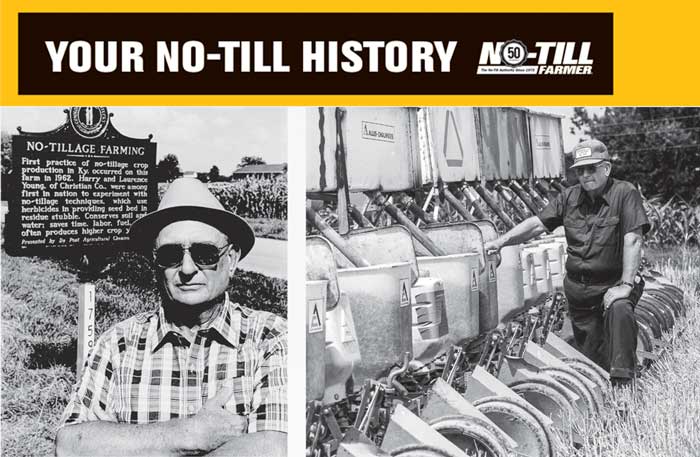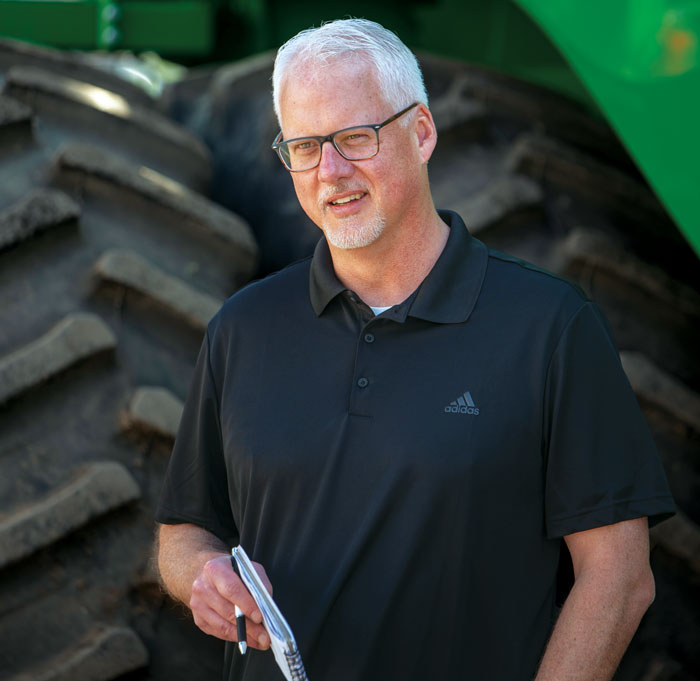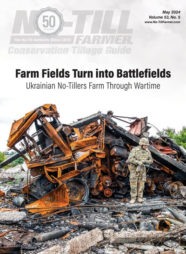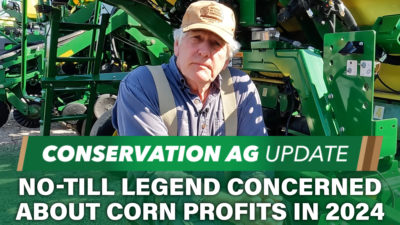
In 1962, Harry M. Young Jr. became the first farmer to no-till on commercial ground. He didn’t anticipate how no-till (a research practice up until that time) would grow. “His training as an ag economist, though, told him it would save labor, fuel, machinery and soil, and it was well worth trying,” says his son, John Young, who contributed to the story below. (Photos by John Harvey and Frank Lessiter)
Last Saturday morning, while working on the April 2023 No-Till Farmer installment in the YOUR NO-TILL HISTORY series, I came across yet another very personal story about Kentucky’s Harry M. Young Jr. and Shirley Phillips, and how their efforts saved a farm — and an entire ag economy.
As Major League Baseball’s spring training starts next week, a previously unrecognized observation on the no-till story began to take root.
U.S. history taught us the Jackie Robinson story and how he was hand-selected by Brooklyn Dodgers Executive Branch Rickey to be the one to break the race barrier (ingrained for 6 decades by then) in the spring of 1947, when #42 lined up at first base.
Rickey’s offer to Robinson was crystal clear about the resistance and responsibility he would need to carry. Rickey knew what was at stake and needed a man of character, fortitude and mental toughness who could earn the necessary respect — and silence the harshest adversaries of the movement.
Rickey chose wisely. Had Robinson fought back, collapsed under pressure or failed in any way, the critics would’ve won, and the progress in desegregation (well beyond the game of baseball) surely would have stalled.
15 Springs Later: Commercial No-Till Arrives
One and a half decades after Robinson forever busted baseball's celling, Young blazed a trail in farming — by planting corn on his Kentucky farmland without a plow.
Unfortunately, I never accompanied my dad, Frank, on one of his trips to Christian County, Ky., before Young’s death in 1988 (though I did eventually get there to see John and son, Alexander, alongside our staff and Wayne Hunt of H&R Agri-Power). I don’t know when I heard the Youngs’ name for the first time, but since my dad was a regular on that farm starting in 1972 (when I was 3), it would have been before I learned the rules of baseball or how to ride a bike.
Back to Saturday morning’s musings about no-till’s “chosen one” and the ensuing questions:
- What if no-till’s first commercial grower didn’t know what he was doing?
- Or wouldn’t share results/findings with others? (In the first 22 years alone, more than 11,000 came to Young's farm to witness the process and its results first-hand.)
- Or didn’t have the right “soft-side“ makeup?
While I’d put the character of America’s farmers right up there with any profession, some would’ve been ill-suited for the responsibility. Not everyone goes about their day in humility, chooses to “sell” with honey or has a view of farming that extends beyond their own fence rows. Some couldn’t have resisted making unattainable claims to defend their “maverick” ways.
I asked John Young, the pioneer’s son (who still farms that hallowed no-till ground and another 6,700 acres) about what might have happened had no-till’s first commercial crop been in the hands of another.
John is as gifted a scribe as he is a farmer, and his words are profound. Here they are, in his own words, from Feb. 12, 2023:
5 Characteristics of a Pioneer
By John Young, Herndon, Ky.
I’m not sure I have any earth-shattering insight about pioneers and such. However, never one to be silent when asked a question, here it goes with some memories of my dad and how they may be turned into generalizations for other pioneers.
1. First and foremost, my father was a teacher. Even before he moved back to the farm, he thrived on being able to present useful information to those around him. He was an instructor of pilots during World War II, then a state farm management specialist for the University of Kentucky’s Extension Service, a Sunday School teacher, then a young farmer teacher in our Christian County, Ky., area, then a nationwide speaker for no-tillage.
It seems to me that anyone who expects to have influence during the time he spends here on earth must be able to teach. Some people are better at writing, some at speaking, and a few are good at both written and verbal communication. Harry Young was one of those who could do both and do them well.
2. The second thing that seems to set pioneers, my father included, aside from many others is that they are constantly looking for a better way of doing things. How would you ever know something is better unless you are looking for it, while wishing the old way would just go away?
Most of us are so fixed on what we have always done that we can’t see the possibilities of something different. Daniel Boone came to Kentucky with just that thought in mind. The Wright Brothers and Thomas Edison — and no-till legends like George McKibben, Eugene Keeton, Howard Martin and Harry Young — were among those who were on the lookout for something better.
3. A third thing that sets pioneers aside is personality. This is more subjective than objective, but it may be the most important characteristic or all. Nobody wants to learn something new from somebody who is unlikeable. A teacher with a friendly, winsome, gregarious personality is just as important as the information itself. There is a little bit of salesman in every pioneer.
My mother used to tell us “a man convinced against his will is of the same opinion still.” Being able to engage people on their level is important if lasting changes are to be won.
4. A fourth item that must be present for a pioneer to be heard (at least in agriculture) is the subject matter itself. A pioneer must not only be convinced that his new idea is worth pursuing, but he must also be correct in his assessment. A dumb, dead-end idea is only accepted when it is part of a political platform. In farming, things must work successfully in order for them to be accepted.
5. Finally, I would include a whole group of characteristics in what have been called “the lesser virtues.” That phrase originated in a book called The Poverty of Nations by Grudem and Asmus. These lesser virtues consist of 1. A job well done, 2. timeliness, 3. cleanliness, 4. gratitude and 5. cheerfulness. There may be others, but those are the ones that come to mind. They don’t turn a bad idea into a good one, but they make the swallowing of new information much more pleasant to those who hear it for the first time. Taken together, they can also make the difference between a successful business and a failure.
Surely, it was a matter of time before the pioneering work of Young’s contemporaries would have brought the commercial success needed to expand the evaluation of the practice and its eventual adoption.
Could there have been any better choice than Young to have birthed the no-till practice commercially? And one with the stature not only to convince Allis-Chalmers to design a planter specific to no-till, but also get one secured for a Brazilian farmer with no down payment?
For more on this story, see the April edition of No-Till Farmer here.
For more on the personalities responsible for 60 years of successful no-tillage, see Profiles in Passion: No-Till's Proven Template for Changing Ag.
The 2024 No-Till History Series is supported by Calmer Corn Heads. For more historical content, including video and multimedia, visit No-TillFarmer.com/HistorySeries.







Post a comment
Report Abusive Comment